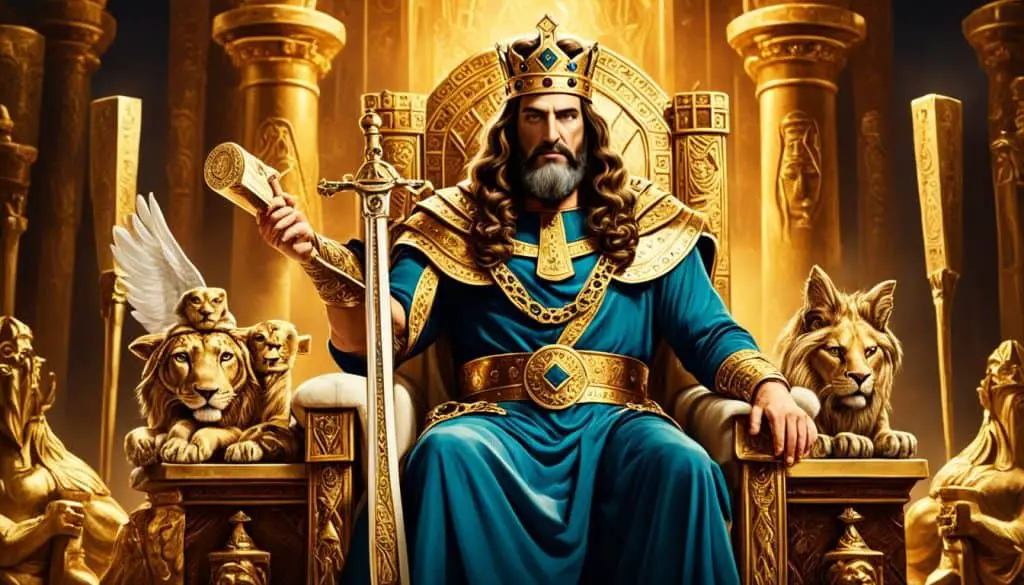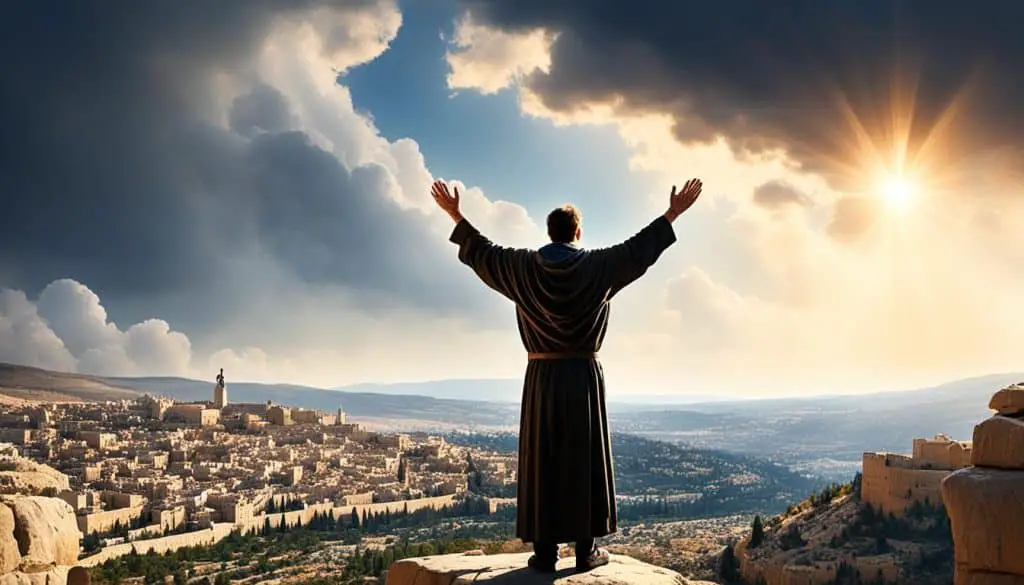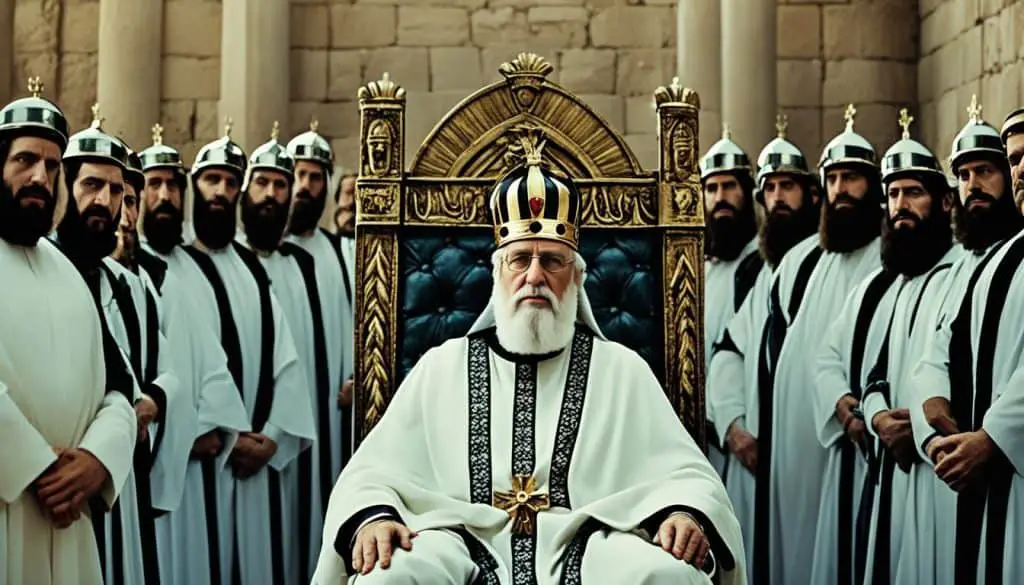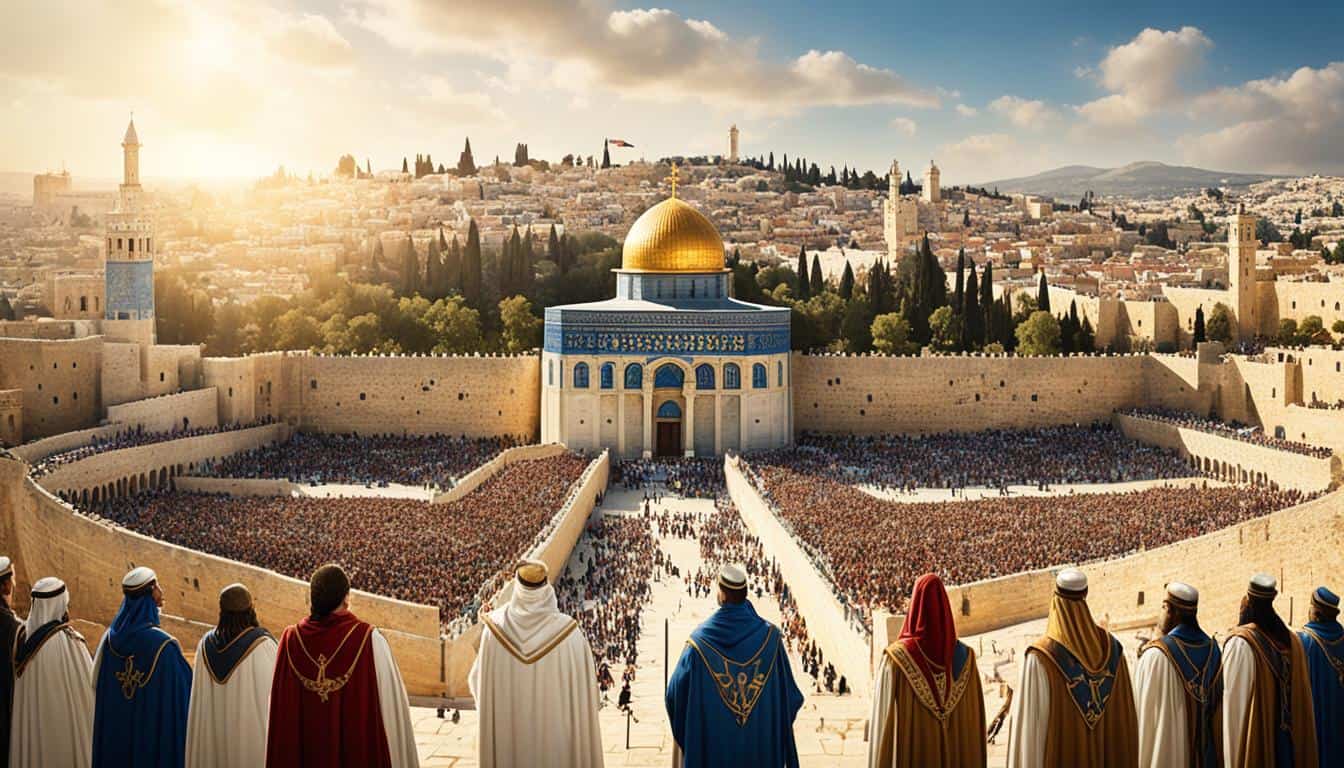Table of Contents
Ever thought about what makes a leader great?
The ancient city of Jerusalem was led by a line of kings. They changed history and taught us about leadership. King David and King Solomon are just two examples.
They showed qualities important for leaders even now. But can they compare to the ultimate King of Zion? Let’s look into Jerusalem’s kings and their leadership secrets.
We will look at kings like David, Solomon, Hezekiah, Josiah, Jehoshaphat, Zedekiah, Cyrus, and Herod the Great. Their leadership skills, actions, and ties to prophecies share wisdom with us. But there’s more to their stories.
We will see how Jesus Christ is seen as the ultimate King of Zion in prophecies. What does His leadership mean for the New Jerusalem? Get ready to explore the mysteries of leadership in Jerusalem’s biblical past.
King David: A Man After God’s Own Heart
We will dive into King David’s leadership, a man after God’s own heart. His rule in Jerusalem hints at Jesus’ everlasting kingdom. David shows us what a godly leader looks like through his actions and close relationship with God.
“And when thy days be fulfilled, and thou shalt sleep with thy fathers, I will set up thy seed after thee, which shall proceed out of thy bowels, and I will establish his kingdom. He shall build an house for my name, and I will stablish the throne of his kingdom forever.” – 2 Samuel 7:12-13
King David’s life points ahead to Jesus being king. Like David was chosen by Samuel, Jesus was chosen by God. David’s dedication to what God wants shows in Jesus’ life too. The Psalms David wrote reflect Jesus’ messages of love, mercy, and fairness.
David’s victory over Goliath shows God’s power through His chosen ones, like Jesus’ victory over sin and death. David making Jerusalem the center and wanting the Ark there previews Jesus’ mission for an eternal kingdom.
David faced tough times and made mistakes, like his affair with Bathsheba. Yet, his saying sorry and love for God highlight his wish for righteousness and mercy. David, in admitting his faults, seeks God’s forgiveness, much like Jesus’ teachings on mercy.
Looking at King David’s life, we find traits of a godly leader: chasing after God, obeying, and asking for forgiveness. David’s reign shows a preview of Jesus’ eternal rule. David, like Jesus, aimed to be a heart after God, offering hope, healing, and an everlasting kingdom to believers.
| Key Aspects | King David | Jesus Christ |
|---|---|---|
| Anointing | Anointed as king by Samuel (1 Samuel 16:13) | Anointed as the eternal King by God Himself (Hebrews 1:9) |
| Establishment of Jerusalem | Made Jerusalem the capital of Israel (2 Samuel 5:6-9) | Will establish the New Jerusalem as the eternal capital (Revelation 21:2) |
| Heart and Obedience | A man after God’s own heart (Acts 13:22) | Perfectly obedient to the Father (Philippians 2:8) |
| Triumph over Adversaries | Defeated Goliath, the giant Philistine warrior (1 Samuel 17:45-47) | Triumphed over sin and death through His resurrection (Colossians 2:15) |
| Repentance and Forgiveness | Repented of his sins and sought forgiveness from God (Psalm 51) | Offers forgiveness and mercy to all who repent and believe in Him (Ephesians 1:7) |
King Solomon: Wisdom and Wealth
King Solomon stands out in biblical history for his wisdom and wealth. His reign was a golden period for Israel, filled with prosperity and wise governance.
The tale of Solomon solving a dispute between two women over a baby is unforgettable. He suggested splitting the baby to identify the real mother. The true mother’s distress led Solomon to give her the baby, showcasing his wisdom.
Solomon’s wisdom came from his deep respect for God and his dedication to seeking divine guidance. When God offered him anything, Solomon chose wisdom to lead his people wisely.
“…give me now wisdom and knowledge, that I may go out and come in before this people…” – 2 Chronicles 1:10 (KJV)
This choice highlights Solomon’s value of wisdom. His wise leadership made him a model for generations to follow.

Solomon’s wisdom reaches even today, influencing us through Jesus Christ’s teachings. Jesus echoed Solomon’s wisdom, especially in the Sermon on the Mount:
“Ask, and it shall be given you; seek, and ye shall find; knock, and it shall be opened unto you.” – Matthew 7:7 (KJV)
Jesus encourages seeking wisdom and understanding, just like Solomon did.
Solomon built a magnificent temple in Jerusalem. This temple symbolized God’s presence, foreshadowing Jesus as the ultimate worship center. The temple represented God among His people and hinted at Jesus’ coming.
Jesus called Himself the true place of worship, beyond just a physical location. This is seen in his conversation with the Samaritan woman:
“But the hour cometh, and now is, when the true worshippers shall worship the Father in spirit and in truth: for the Father seeketh such to worship him.” – John 4:23 (KJV)
Jesus showed that true worship happens in our hearts and spiritual connection with Him, going beyond physical places.
The Wisdom of Seeking Wisdom
King Solomon’s story reminds us of the importance of seeking wisdom and a spiritual foundation. His wisdom improved his leadership and the kingdom’s prosperity.
Like Solomon, we should humbly seek God’s wisdom. It will help us make clear decisions and lead wisely in our lives.
Through Solomon’s temple, we see Jesus as the ultimate worship space. Embracing Jesus lets us experience true fulfillment and the joy of spiritual worship.
In summary, Solomon’s wisdom and wealth make him a significant leader. He shows us the importance of seeking wisdom, connecting with God, and recognizing Jesus as our worship focus. Following Solomon’s example leads us to the powerful teachings of Jesus in our lives.
| Wisdom | Wealth |
|---|---|
| Solomon’s wisdom reflected in his wise judgments and decisions. | Under Solomon’s rule, the kingdom of Israel experienced unprecedented wealth and prosperity. |
| Solomon’s wisdom was sought by people from neighboring nations. | Trade and commerce flourished during Solomon’s reign, bringing immense wealth to the kingdom. |
| Solomon’s wisdom was a gift from God, granted in response to his humble request. | The abundance of wealth in Israel during Solomon’s reign was seen as a blessing from God. |
King Hezekiah: Faith and Reform
We now focus on King Hezekiah in our journey through Jerusalem’s history. He is celebrated for his strong faith and keen on reform. His actions during the Assyrian siege show a deep trust in God, similar to Jesus during his time on earth.
When faced with great challenges, Hezekiah sought God’s guidance. Like Jesus leaned on his Father, Hezekiah trusted God’s faithfulness. This trust helped him lead his people and overcome their enemies.
A major event in Hezekiah’s reign was the passover celebration. He reinstated this key religious event to honor God. This celebration is akin to Jesus’ sacrifice, who is seen as the Passover Lamb removing the world’s sins.
Hezekiah’s passover also highlighted Jesus’ sacrifice, which brings salvation and forgiveness. Hezekiah’s work and focus on passover played into God’s bigger plan. This prepared for the salvation that comes through Jesus Christ.
Learning from King Hezekiah teaches us to deepen our trust in God and see Jesus’ sacrifice’s value. Like him, we should seek God, trust in His promise, and follow His commands. Facing life’s hurdles, let’s be inspired by Hezekiah’s example. Let’s aim to emulate the leadership of Jesus Christ.
King Josiah: Rediscovering the Law
King Josiah was known for his deep commitment to God’s word. Like Jesus, he followed scripture closely. His reforms highlight Jesus’ mission to complete the law.
Josiah found the Book of the Law in the temple, as recorded in 2 Kings 22:8-10. This event motivated him to align his nation with God’s commands. He worked hard to remove idol worship and bring back true worship.
“And he brought all the priests out of the cities of Judah, and defiled the high places where the priests had burned incense, from Geba to Beersheba, and brake down the high places of the gates that were in the entering in of the gate of Joshua the governor of the city, which were on a man’s left hand at the gate of the city.”
Josiah’s changes were deep and sincere. He held a unique passover feast in Jerusalem, based on the law (2 Chronicles 35:1-19). His actions sparked a major spiritual renewal in the nation.
Jesus also underscored scripture’s value and its fulfillment. He declared, “I have not come to abolish the Law or the Prophets; I have come to fulfill them” (Matthew 5:17). Through His life, teachings, and sacrifice, Jesus perfectly adhered to the law.
By examining Josiah’s efforts, we see how vital it is to study and follow God’s Word. Josiah’s dedication led to spiritual revival. Similarly, Jesus’ commitment to scripture offers eternal salvation to believers.
| Key Points | Explanations |
|---|---|
| Josiah rediscovered the law | Highlighting the significance of studying and living by God’s Word |
| Josiah’s reforms aligned with God’s commands | Examining the impact of living according to God’s law |
| Jesus fulfilled the law | Drawing parallels between Josiah’s commitment to the law and Jesus’ mission to fulfill it |
King Jehoshaphat: Seeking God’s Guidance
King Jehoshaphat was a key figure in the Bible, known for wanting to follow God’s guidance. He often turned to God for the wisdom to lead his people. This shows us the value of talking to God for insight and direction.
In 2 Chronicles 20, a story unfolds where Jehoshaphat faces a huge enemy force. He brings people together to ask for God’s help. He prays to God, admitting they are powerless and not knowing what to do. Their hope was in God’s hands.
“O our God, wilt thou not judge them? For we have no might against this great company that cometh against us; neither know we what to do: but our eyes are upon thee.” – 2 Chronicles 20:12 (KJV)
Jehoshaphat’s prayer showed his total trust in God and his awareness of their need for guidance. God responded when Jahaziel, filled with the Spirit, brought a message of hope. He told them God would be on their side.
Following God’s guidance, Jehoshaphat’s plan was unusual. He sent singers ahead of the army to praise God. This act of worship led to their enemies’ defeat, as God confused them.
The Spiritual Warfare in Christ
This story is a metaphor for our spiritual battles today. Like Jehoshaphat, we must rely on God and praise Him when facing challenges. This approach to spiritual warfare mirrors how believers in Christ should act.
Jesus, too, depended on prayer. Before His crucifixion, He prayed in Gethsemane, committing to God’s will. This shows the power and necessity of seeking God’s direction in tough times.
“O my Father, if it be possible, let this cup pass from me: nevertheless not as I will, but as thou wilt.” – Matthew 26:39 (KJV)
Jesus’ prayer reveals His trust in God amidst difficult decisions. It’s a lesson for us to seek God’s will and surrender our desires. This is crucial in our spiritual struggles.
Looking at Jehoshaphat and Jesus, we learn the importance of seeking God. Like them, we need to trust in God and worship Him in hard times. This strengthens our faith and trust in the Lord.

The Lessons of Jehoshaphat’s Battle Strategy
Jehoshaphat’s unique strategy teaches us important lessons for facing spiritual challenges. It wasn’t about human strength but recognizing God’s power. They made God the center of their strategy by praising and worshiping Him.
- Seek God’s guidance: Jehoshaphat showed the importance of prayer in seeking God’s wisdom. This helps us face spiritual battles wisely and faithfully.
- Depend on God’s power: We should trust in God’s strength over our own. In Christ, we have His power to face any challenge (Ephesians 1:19-20).
- Praise and worship: Praising and worshiping God brings His presence into our struggles. It turns our attention from our problems to God’s might.
In the end, King Jehoshaphat’s leadership and Jesus’ prayer life remind us to seek God’s guidance. Their examples teach us the power of prayer, praise, and faith in overcoming obstacles. By following their trust in God, we can find victory and the spiritual blessings God has for us.
King Zedekiah: The Cost of Disobedience
This section delves into King Zedekiah’s rule and the high cost of his disobedience. Unlike Jesus, who always obeyed God, Zedekiah ignored divine warnings. We’ll explore the fallout from neglecting God’s messages, as seen in his reign.
Zedekiah was Judah’s last king and faced significant adversity. He disregarded Jeremiah’s prophetic warnings and defied Babylon. This rebellion led to Jerusalem and the temple’s downfall, exactly as prophets predicted.
“But he rebelled against him in sending his ambassadors into Egypt, that they might give him horses and much people. Shall he prosper? shall he escape that doeth such things? or shall he break the covenant, and be delivered?” – Ezekiel 17:15 (KJV)
Zedekiah’s defiance brought disaster not only on himself but on his nation. Babylonian forces besieged Jerusalem, destroying the city. Zedekiah saw his sons killed before being blinded and taken to Babylon. This marked the monarchy’s end in Judah.
In stark contrast, Jesus Christ lived a life of complete obedience to God. He followed God’s will unconditionally, even facing death to save humanity.
“And being found in fashion as a man, he humbled himself, and became obedient unto death, even the death of the cross.” – Philippians 2:8 (KJV)
Jesus’ obedience is a lesson for us, showcasing the terrible outcomes of ignoring God. Zedekiah’s refusal to listen led to Jerusalem’s ruin and the Israelites’ exile. Disobedience brings negative consequences, just as it did for him.
We should learn from Zedekiah and aim to follow God’s Word like Jesus did. By obeying, we enjoy God’s blessings instead of facing hardships for turning away.

Reflecting on King Zedekiah’s story reminds us to heed God’s commands. Let Jesus’ perfect obedience motivate us to emulate Him in our lives.
King Cyrus: An Unlikely Liberator
We’re going to look at King Cyrus’s leadership. He was surprising but key in freeing Jerusalem. Even though he wasn’t a Jewish king, his decision to rebuild Jerusalem is crucial for understanding Jesus’ role.
Studying Cyrus’s actions through Isaiah’s prophecies, we get important insights into Jesus Christ’s mission.
King Cyrus led Persia between 559 and 530 BC. The Old Testament, especially in Isaiah, talks about him. Isaiah 44:28 has God saying Cyrus will rebuild Jerusalem and its temple. This foreshadows Jesus’ role as a restorer who establishes His eternal kingdom.
“Thus saith of Cyrus, He is my shepherd, and shall perform all my pleasure: even saying to Jerusalem, Thou shalt be built; and to the temple, Thy foundation shall be laid.” – Isaiah 44:28
In Isaiah 45:1, a prophecy says Cyrus was chosen by God. God helped him conquer nations and open Jerusalem’s gates. This started Jerusalem’s restoration.
Jesus, like Cyrus, aimed to restore God’s people and start a kingdom of freedom. Cyrus let Jewish exiles return home. In contrast, Jesus came to fix our bond with God and lead us to eternal freedom.

Looking at King Cyrus’s deeds helps us see Jesus’ mission. Jesus came to free us from sin, bring us back to God, and give back our spiritual inheritance. His death made our freedom and salvation possible.
Next, we’ll dive into Jesus Christ’s kingship. He’s the eternal King, greater than any king of Jerusalem. By looking at His birth, divine rule, and future reign in New Jerusalem, we’ll understand His unique leadership and lasting impact.
How Did Women Contribute to the Leadership in Jerusalem’s Biblical History?
In the women in Jerusalem narrative, we see influential figures like Queen Esther, who used her leadership and courage to save her people. The biblical history of Jerusalem also includes Deborah, a respected judge and prophetess who played a crucial role in leading the Israelites. These women contributed significantly to the leadership in Jerusalem’s history.
The Promised Eternal King: Jesus Christ
This last part covers Jesus Christ, the promised eternal King. Old Testament prophecies spoke of a Zion King who would deliver us and start an enduring kingdom. Jesus exceeds all past Jerusalem kings in leadership.
Jesus led with love, grace, and humility. While other kings chased power for themselves, Jesus aimed to serve and sacrifice His life for us. He shared deep truths, healed ill people, and showed power over nature and evil spirits. His way of leading focused on being right, just, and kind.
With His birth, Jesus fulfilled Old Testament promises as the divine King. He brings forgiveness, rescue, and forever life to anyone who trusts in Him. According to Revelation, His rule in New Jerusalem promises a flawless realm. It will be a place where goodness and peace always exist.




